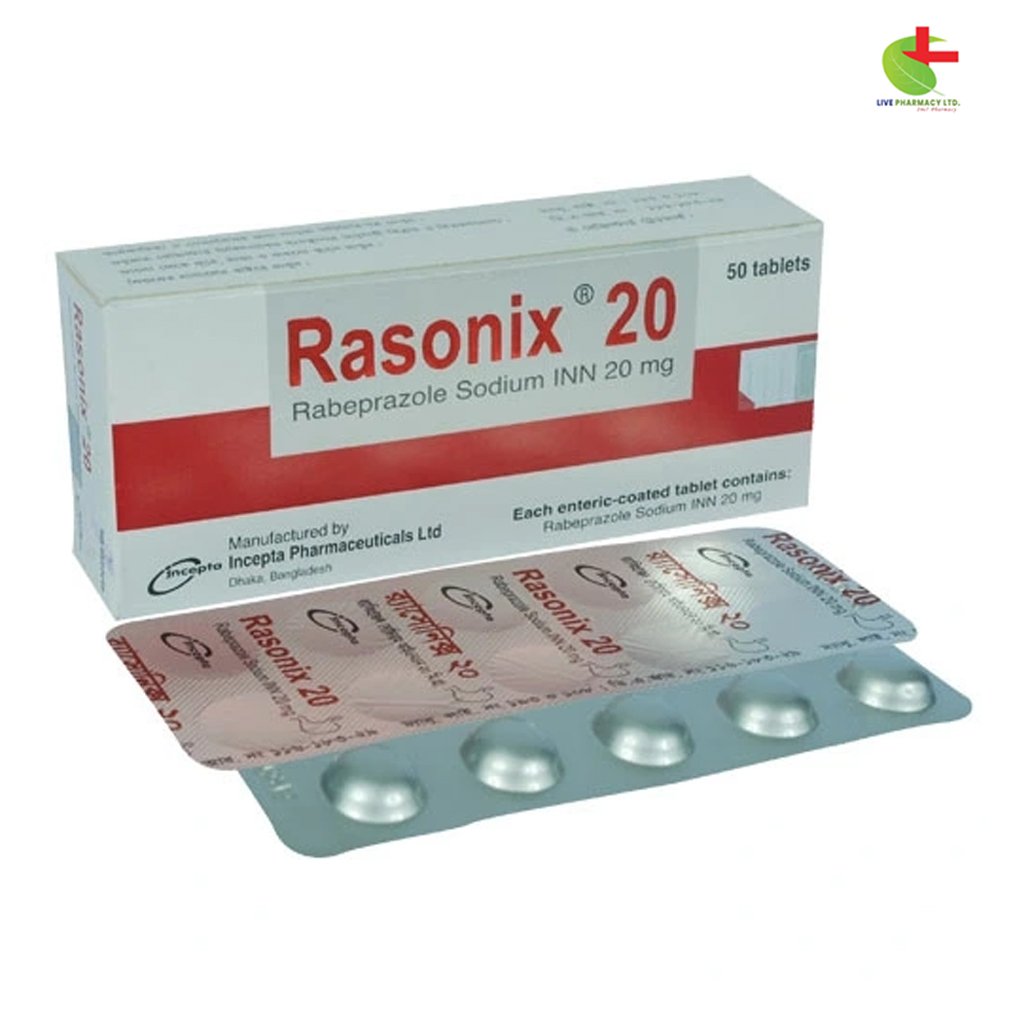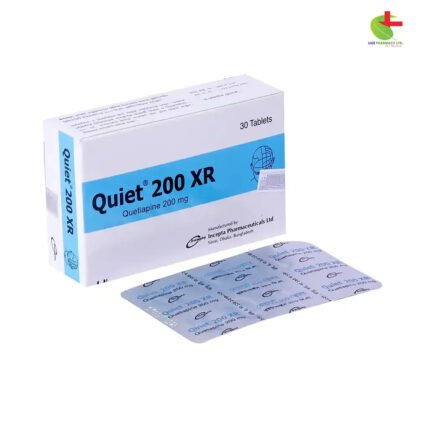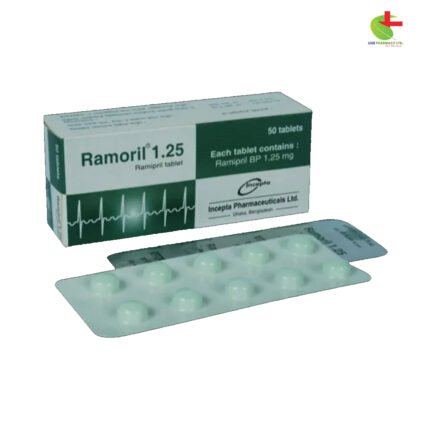Rasonix 20
70.00৳ Strip
- Rasonix (Rabeprazole) is a proton pump inhibitor.
- Used to treat active duodenal and gastric ulcers, GERD, and Zollinger-Ellison syndrome.
- Helps eradicate Helicobacter pylori in peptic ulcer disease.
- Reduces stomach acid production, promoting healing of the stomach lining.
- Available in gastro-resistant tablets for short-term and long-term management.
- Dosage is tailored to the specific condition and should be used under a healthcare professional’s guidance.
 Brand
Brand
|
Incepta Pharmaceuticals Ltd |
|---|---|
 Generics
Generics
|
Rabeprazole Sodium |
 Type
Type
|
Tablet |
Indications for Use
Rasonix Gastro-Resistant Tablets are prescribed for the treatment of the following conditions:
- Active Duodenal Ulcer
- Active Benign Gastric Ulcer
- Symptomatic Erosive or Ulcerative Gastroesophageal Reflux Disease (GERD)
- Long-term Management of GERD (GERD Maintenance)
- Symptomatic Relief of Moderate to Severe GERD
- Zollinger-Ellison Syndrome
- Eradication of Helicobacter Pylori in Peptic Ulcer Disease (when used with appropriate antibacterial treatment)
Always use Rasonix as directed by a registered healthcare professional.
Pharmacological Action
Rasonix (Rabeprazole) works by inhibiting the gastric H+/K+-ATPase enzyme in the parietal cells of the stomach, effectively reducing gastric acid secretion. This enzyme, often referred to as the proton pump, plays a central role in acid production, making Rabeprazole a potent gastric proton pump inhibitor.
Dosage and Administration
Active Duodenal and Gastric Ulcers
- Dosage: 20 mg once daily in the morning.
- Duration: Most patients heal within 4 weeks for duodenal ulcers and 6 weeks for gastric ulcers. Some may need an additional 4–6 weeks for full recovery.
Erosive or Ulcerative GERD
- Dosage: 20 mg once daily for 4 to 8 weeks.
GERD Maintenance (Long-Term Management)
- Dosage: 20 mg or 10 mg once daily, adjusted based on the patient’s response.
Symptomatic GERD (Moderate to Severe)
- Dosage: 10 mg once daily. If symptoms persist after 4 weeks, further evaluation may be required. Maintenance can be managed with an on-demand regimen (10 mg as needed).
Pediatric GERD Treatment (Ages 1-11)
- For Children <15 kg: 5 mg once daily for up to 12 weeks (may increase to 10 mg if necessary).
- For Children ≥15 kg: 10 mg once daily for up to 12 weeks.
Zollinger-Ellison Syndrome
- Starting Dose: 60 mg once daily, which may be increased up to 120 mg/day depending on individual patient needs. Doses above 100 mg/day may require twice-daily administration.
Helicobacter Pylori Eradication
- Combination Therapy: 20 mg of Rabeprazole twice daily, along with Clarithromycin 500 mg twice daily and Amoxicillin 1g twice daily for 7 days.
Always follow your healthcare provider’s instructions for proper dosing.
Administration Instructions
Rasonix tablets should be taken once daily in the morning before meals. While food intake or the time of day does not affect the drug’s activity, taking it consistently at the same time each day can improve adherence to the treatment plan. Do not chew or crush the tablets; swallow them whole to ensure proper release of the medication.
Consult with a healthcare professional for personalized guidance.
Drug Interactions
- Increased Risk of Decreased Absorption: Co-administration of Rasonix with certain medications, such as ketoconazole or itraconazole, may reduce their effectiveness due to changes in stomach pH.
- Antacid Interaction: No significant interaction with liquid antacids.
- Atazanavir: Rabeprazole may reduce the absorption of atazanavir. Do not co-administer with atazanavir.
Always inform your doctor about all other medications you’re taking.
Contraindications
Rasonix should not be used in individuals who have a known hypersensitivity to Rabeprazole or any of the excipients. It is also contraindicated during pregnancy and breastfeeding unless deemed essential by a healthcare provider.
Possible Side Effects
Rasonix is generally well-tolerated, but some users may experience side effects such as:
- Common Side Effects: Headache, diarrhea, abdominal pain, nausea, constipation, dry mouth, muscle pain, dizziness, or fatigue.
If any side effects persist or worsen, consult your healthcare provider.
Pregnancy and Lactation
Rasonix is classified as Pregnancy Category C by the FDA. Animal studies have shown no harm to the fetus, but there are no sufficient studies in pregnant humans. Consult your doctor before using during pregnancy or breastfeeding.
Precautions and Warnings
- Cancer Risk: Symptom relief with Rasonix does not rule out the possibility of gastric or esophageal cancer, and the presence of malignancy should be ruled out before starting treatment.
- Fracture Risk: Long-term use of proton pump inhibitors (PPIs) like Rabeprazole may increase the risk of bone fractures, particularly in the elderly or those with other risk factors. Ensure adequate intake of vitamin D and calcium.
- Liver Function: Use with caution in patients with severe liver impairment. Regular monitoring may be necessary.
- Hypomagnesemia: Prolonged use of PPIs may lead to low magnesium levels, causing fatigue, muscle cramps, or heart arrhythmias. Magnesium levels should be monitored in patients on long-term therapy, especially those taking diuretics.
- Vitamin B12 Absorption: Prolonged use of Rasonix may impair the absorption of vitamin B12. Periodic monitoring is recommended.
Consult your healthcare provider for further details on precautions.
Use in Special Populations
- Renal and Hepatic Impairment: No dosage adjustment is necessary for patients with mild to moderate renal or hepatic impairment.
- Pediatric Use: The safety and effectiveness of Rasonix in children have not been established.
Overdose Information
Rasonix overdose generally results in mild and reversible symptoms, including those typical of the known side effect profile. No specific antidote is available, and treatment should focus on supportive care. Rasonix is extensively protein-bound and cannot be removed via dialysis.
Storage Instructions
Store Rasonix below 30°C in a dry place, away from direct light. Keep out of reach of children.
Therapeutic Class
Proton Pump Inhibitor (PPI)













Reviews
There are no reviews yet.